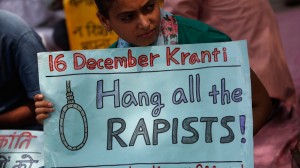No hope in sight
 Every day, in every walk of my life in Germany, I am confronted with these questions. My colleagues ask me these questions, my cab drivers asks me these questions, my husband asks me these questions, strangers who I meet for the first time ask me these questions as soon as they find out that I am Indian.
Every day, in every walk of my life in Germany, I am confronted with these questions. My colleagues ask me these questions, my cab drivers asks me these questions, my husband asks me these questions, strangers who I meet for the first time ask me these questions as soon as they find out that I am Indian.
“So, what is going on in your country? What is wrong your people? Was it always like this? Why doesn’t someone do something about it? Where does the problem really lie? How can the men be so brutal? How can the men even come up with the idea of raping someone? Don’t they have mothers, sisters? What would your family do if you were raped? Would they go to court? What would your family do if your brother raped someone? Would they protect him? Don’t passers-by help or intervene? Why don’t the rapists get punished? What is the government in your country doing?”
In the beginning, I tried to give an explanation, but the truth was that I was simply dumbfounded and shocked. My thoughts kept going back to my 22-year-old sister who lives in Mumbai by herself and works odd hours. My mother’s face is fraught with worry lines and since December she has been susceptible to losing her calm if my sister doesn’t check in with her at least once a day. “Satan” is out there and the only way women can protect themselves is by staying locked up. Even that is not really a safe option because Satan could strike while you are home alone!
It was this Satan that robbed me of my carefree years as I grew up in Delhi. I wasn’t allowed to step out of the house wearing sleeveless clothes, dating a boy from college was taboo, bringing boy classmates home was only allowed in my father’s presence, even the plumber or any other handyman was a suspect. The family driver was thoroughly scrutinized before he was hired. Any men outside of the family were to be kept at a distance.
A lot has been written about the problem of rape, solutions have been debated over and over again, all kinds of controversial comments have been made, politicians have been squirming in their seats because the protesters have taken it to the streets and everybody wants a solution. What are the solutions and where does one start?
Women are asked not to take any risks by travelling alone at odd hours and to be appropriately dressed. Educating the masses is one long-term solution which could take a couple of decades. The “Indian” mindset is not going to change overnight. A lot of people are harping about educating the lower classes and migrants that wander to the cities, as these are allegedly the kind of men who are branded as “rapists.”
Solving the problem of unemployment is also one way of solving the problem of crime. Tackling corruption in the police force will make a huge difference, but the question is if these measures will solve the problem of violence against women and make India a safe country? A country that has laws which fail to deliver justice will never be a country that is safe for women. A woman’s honor is the one thing that can be damaged and taken away for ever and not even capital punishment is justice enough.
The only immediate solution to the problem is right in front of us. Deploying a force for the safety of women and improving the law and order situation by putting the rapists behind bars. No red tape, no bureaucracy, just life term imprisonment. A fear of the law needs to penetrate the society along with educational campaigns to make a lasting impact. Since, the government is not acting fast enough, I have given up hope.
Author: Roma Rajpal-Weiss
Editor: Manasi Gopalakrishnan
Roma Rajpal-Weiß is an Indian Journalist and Blogger based in Bonn. She can be followed on Twitter @romarajpal.






